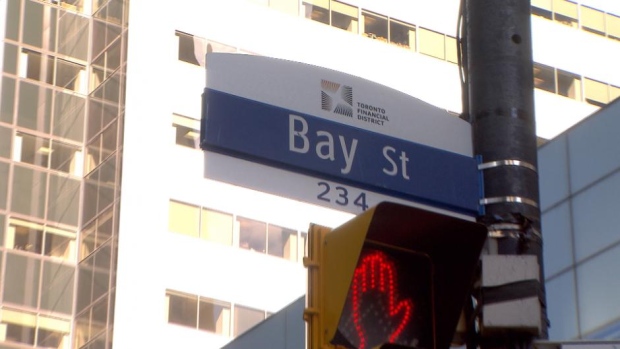Apr 11, 2017
TSX ends lower despite Bombardier shares rising on merger report
, Reuters

Canada's benchmark stock index ended barely lower on Tuesday as financial stocks weighed, while a flight to safety helped gold miners and shares of Bombardier Inc jumped on reports it was discussing a merger of rail operations with Siemens.
Gold prices jumped to a fresh five-month high and bond yields fell with geopolitical worries about North Korea, the Middle East and the looming French election spurring investors to seek assets seen as havens from risk.
"In broad strokes it's a flight-to-safety day in both Canada and the U.S.," said Luciano Orengo, portfolio manager at Manulife Asset Management.
Barrick Gold Corp advanced 3.1 per cent to $26.79 and Goldcorp Inc rose 2.7 per cent to $20.44.
The materials group, which includes precious and base metals miners and fertilizer companies, added 1.7 per cent.
The Toronto Stock Exchange's S&P/TSX composite index ended down 3.68 points, or 0.02 per cent, at 15,727.11.
Half of its 10 main sectors fell, with the heavyweight financial sector off 0.4 per cent as U.S. 30-year bond yields touched three-month lows. Bank of Montreal ended down 1.1 per cent at $98.80.
"In order to see financials get going again you're going to have to see yields move back up," Orengo said.
Bombardier shares gained 4.5 per cent to $2.32. The Canadian plane and train maker is in talks with Germany's Siemens to combine their rail operations, two people close to the matter told Reuters, a move that could strengthen their hand against Chinese state-backed market leader CRRC Corp.
Energy stocks slipped despite oil prices turning positive on reports that Saudi Arabia has told OPEC officials it wants to continue output cuts for an additional six months.
Pipeline company Enbridge Inc declined 1.3 per cent to $56.26 and Suncor Energy declined 0.8 per cent to $41.47.
"We're bullish energy," Orengo said. "I don't expect oil prices to go gangbusters from here, but you could get a rally to [US]$58 or so before you see more concerns about more supply coming from the U.S."
U.S. oil futures settled up at US$53.40 a barrel and later extended those gains after data showed a surprise draw in U.S. crude inventories.
U.S. MARKETS
U.S. stocks ended down but well off the day's lows on Tuesday, with worries over geopolitical risks dragging down sentiment as investors readied for the start of U.S. earnings.
The worries drove investors into gold and other safe-haven assets and pushed up the CBOE Volatility index, Wall Street's "fear gauge," which closed above 15 for the first time since Election Day.
"Geopolitical risk is the focal point right now," said Quincy Krosby, market strategist at Prudential Financial in Newark, New Jersey.
But, she said, "this is also a market trading at 18, 19 times forward earnings, and that's the higher range. The earnings season is unfolding, and that's going to be important."
Earnings season begins this week with results from a handful of banks. The financial sector, down 0.3 per cent, was among the day's worst performers.
Technology was the biggest drag, with the tech index down 0.4 per cent.
The Syrian Observatory for Human Rights said Syrian government warplanes dropped barrel bombs on rebel-held areas of Hama province on Tuesday, a day after the United States said their use could lead to further U.S. strikes in Syria.
Trump ordered a missile strike on the war-torn country last week as a response to a poison gas attack that his administration blamed on government forces, pitting the United States against Russia, which backs Syrian President Bashar al-Assad.
Adding to the dour mood, North Korea state media warned of a nuclear attack on the United States if provoked as a U.S. Navy strike group moved toward the western Pacific.
The Dow Jones Industrial Average ended down 6.72 points, or 0.03 per cent, to 20,651.3, the S&P 500 lost 3.38 points, or 0.14 per cent, to 2,353.78 and the Nasdaq Composite dropped 14.15 points, or 0.24 per cent, to 5,866.77.
Stocks cut their losses in the last part of the session, though.
Trump, during a meeting with chief executives of U.S. companies, said his administration was working to reduce regulations and revamp the Dodd-Frank Wall Street reform law, which may be eliminated and replaced with "something else."
Shares of United Continental fell 1.1 per cent after a worldwide backlash erupted against the carrier over a passenger who was dragged off one of its U.S. flights. Late in the trading session, its chief executive issued an apology.
Thursday will be the last trading day of the week on Wall Street ahead of the Good Friday holiday.
About 6.4 billion shares changed hands on U.S. exchanges, compared with the 6.7 billion daily average for the past 20 trading days, according to Thomson Reuters data.
Advancing issues outnumbered declining ones on the NYSE by a 1.61-to-1 ratio; on Nasdaq, a 1.29-to-1 ratio favored advancers.
The S&P 500 posted five new 52-week highs and one new low; the Nasdaq Composite recorded 59 new highs and 44 new lows.




